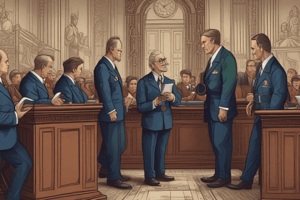Podcast
Questions and Answers
In which scenario would the 'public safety' exception to Miranda rights, established in New York v. Quarles, most likely apply?
In which scenario would the 'public safety' exception to Miranda rights, established in New York v. Quarles, most likely apply?
- Questioning a suspect about the location of a weapon believed to be hidden in a public park. (correct)
- Interrogating a suspect at the police station several hours after an arrest.
- Obtaining consent to search a vehicle after a routine traffic stop.
- Requesting routine information from a suspect during booking.
A police officer conducts a pat-down search of an individual based on reasonable suspicion and discovers an illegal weapon. This scenario is most directly related to the principles established in which court case?
A police officer conducts a pat-down search of an individual based on reasonable suspicion and discovers an illegal weapon. This scenario is most directly related to the principles established in which court case?
- Weeks v. United States
- Terry v. Ohio (correct)
- Gideon v. Wainwright
- Furman v. Georgia
Which of the following scenarios best illustrates the application of the 'inevitable discovery' exception, as established in Nix v. Williams?
Which of the following scenarios best illustrates the application of the 'inevitable discovery' exception, as established in Nix v. Williams?
- Evidence is excluded because the police acted in bad faith when obtaining a search warrant.
- A confession obtained without Miranda warnings is admitted because the suspect voluntarily waived their rights.
- Illegally obtained evidence is suppressed to deter future police misconduct.
- Evidence found during an illegal search is admitted because the police would have eventually obtained a valid warrant. (correct)
How did Maryland v. Wilson expand the precedent set by Terry v. Ohio?
How did Maryland v. Wilson expand the precedent set by Terry v. Ohio?
The Bail Reform Act of 1984, upheld in United States v. Salerno, allows for what specific practice?
The Bail Reform Act of 1984, upheld in United States v. Salerno, allows for what specific practice?
Morrissey v. Brewer addresses the due process rights of individuals in which specific situation?
Morrissey v. Brewer addresses the due process rights of individuals in which specific situation?
What specific right did Mempa v. Rhay extend to defendants in probation revocation hearings?
What specific right did Mempa v. Rhay extend to defendants in probation revocation hearings?
While Gagnon v. Scarpelli extended due process rights to probation revocation hearings, what qualification did it place on the right to counsel in such hearings?
While Gagnon v. Scarpelli extended due process rights to probation revocation hearings, what qualification did it place on the right to counsel in such hearings?
Which landmark Supreme Court case established the right to counsel for indigent defendants in state criminal trials?
Which landmark Supreme Court case established the right to counsel for indigent defendants in state criminal trials?
What was the primary outcome of the Supreme Court's decision in Furman v. Georgia?
What was the primary outcome of the Supreme Court's decision in Furman v. Georgia?
The exclusionary rule, established in Weeks v. United States, prevents what practice?
The exclusionary rule, established in Weeks v. United States, prevents what practice?
Under what circumstances does the 'good faith' exception to the exclusionary rule, established in United States v. Leon, allow the admission of illegally obtained evidence?
Under what circumstances does the 'good faith' exception to the exclusionary rule, established in United States v. Leon, allow the admission of illegally obtained evidence?
What is the central holding of United States v. Drayton regarding police searches on buses?
What is the central holding of United States v. Drayton regarding police searches on buses?
A suspect is arrested for robbery. During the arrest, the officer searches the suspect and finds a handgun, without reading the Miranda Rights. The suspect is then interrogated and admits to a prior shooting. Based on the content provided, which piece of evidence is most likely to be excluded from trial?
A suspect is arrested for robbery. During the arrest, the officer searches the suspect and finds a handgun, without reading the Miranda Rights. The suspect is then interrogated and admits to a prior shooting. Based on the content provided, which piece of evidence is most likely to be excluded from trial?
An officer pulls over a vehicle for speeding. Upon approaching the vehicle, the officer notices furtive movements by the passenger. Citing Maryland v. Wilson, what action can the officer legally take?
An officer pulls over a vehicle for speeding. Upon approaching the vehicle, the officer notices furtive movements by the passenger. Citing Maryland v. Wilson, what action can the officer legally take?
A judge denies bail to an individual charged with drug trafficking, arguing that the individual poses a significant risk to the community if released. Which Supreme Court case provides the most direct legal support for the judge's decision?
A judge denies bail to an individual charged with drug trafficking, arguing that the individual poses a significant risk to the community if released. Which Supreme Court case provides the most direct legal support for the judge's decision?
A parole officer revokes an individual's parole without providing them notice of the violations, a hearing, or the opportunity to present evidence. Which Supreme Court case is most relevant to challenging this revocation?
A parole officer revokes an individual's parole without providing them notice of the violations, a hearing, or the opportunity to present evidence. Which Supreme Court case is most relevant to challenging this revocation?
An individual is charged with a misdemeanor and cannot afford an attorney. The judge refuses to appoint counsel, arguing that the right to counsel only applies to felony cases. Which Supreme Court case directly contradicts the judge's decision?
An individual is charged with a misdemeanor and cannot afford an attorney. The judge refuses to appoint counsel, arguing that the right to counsel only applies to felony cases. Which Supreme Court case directly contradicts the judge's decision?
During a drug investigation, police illegally search a suspect’s home and find evidence. They then use that information to obtain a valid search warrant and find more evidence. Can the second batch of evidence be admitted in court?
During a drug investigation, police illegally search a suspect’s home and find evidence. They then use that information to obtain a valid search warrant and find more evidence. Can the second batch of evidence be admitted in court?
An officer asks a bus passenger for permission to search their bag. The officer does not inform the passenger that they have the right to refuse the search, and the passenger consents. Is the search valid?
An officer asks a bus passenger for permission to search their bag. The officer does not inform the passenger that they have the right to refuse the search, and the passenger consents. Is the search valid?
Flashcards
Terry v. Ohio
Terry v. Ohio
Allows police to briefly detain and pat down individuals based on reasonable suspicion, without a warrant.
Nix v. Williams
Nix v. Williams
Allows illegally obtained evidence if it would have inevitably been discovered through legal means.
New York v. Quarles
New York v. Quarles
Allows police to question suspects without Miranda warnings if there is an immediate threat to public safety.
Maryland v. Wilson
Maryland v. Wilson
Signup and view all the flashcards
United States v. Salerno
United States v. Salerno
Signup and view all the flashcards
Morrissey v. Brewer
Morrissey v. Brewer
Signup and view all the flashcards
Mempa v. Rhay
Mempa v. Rhay
Signup and view all the flashcards
Gagnon v. Scarpelli
Gagnon v. Scarpelli
Signup and view all the flashcards
Gideon v. Wainwright
Gideon v. Wainwright
Signup and view all the flashcards
Weeks v. United States
Weeks v. United States
Signup and view all the flashcards
United States v. Leon
United States v. Leon
Signup and view all the flashcards
United States v. Drayton
United States v. Drayton
Signup and view all the flashcards
Study Notes
- Terry v. Ohio: Established the "stop and frisk" exception to the Fourth Amendment's warrant requirement, allowing police to briefly detain and pat down individuals based on reasonable suspicion of criminal activity.
- Nix v. Williams: Introduced the "inevitable discovery" exception to the exclusionary rule, permitting illegally obtained evidence to be admitted if it would have inevitably been discovered through legal means.
- New York v. Quarles: Created the "public safety" exception to Miranda rights, allowing police to question suspects without Miranda warnings if there is an immediate threat to public safety.
- Maryland v. Wilson: Expanded the scope of Terry v. Ohio, permitting police to order passengers out of a lawfully stopped vehicle for officer safety.
- United States v. Salerno: Upheld the Bail Reform Act of 1984, allowing for the preventative detention of individuals who pose a danger to the community.
- Morrissey v. Brewer: Established due process requirements for parole revocation hearings, including notice, a hearing, and the right to confront witnesses.
- Mempa v. Rhay: Extended the right to counsel to probation revocation hearings where sentencing is imposed.
- Gagnon v. Scarpelli: Extended due process rights to probation revocation hearings, but held that the right to counsel should be determined on a case-by-case basis.
- Gideon v. Wainwright: Established the right to counsel for indigent defendants in state criminal trials, guaranteeing the right to an attorney for those who cannot afford one.
- Furman v. Georgia: Led to a temporary moratorium on the death penalty, finding that its application was arbitrary and discriminatory, violating the Eighth and Fourteenth Amendments.
- Weeks v. United States: Established the exclusionary rule in federal courts, prohibiting the use of illegally obtained evidence.
- United States v. Leon: Created the "good faith" exception to the exclusionary rule, allowing the admission of evidence obtained through a search warrant that is later deemed invalid if the officers acted in good faith.
- United States v. Drayton: Ruled that police officers are not required to inform bus passengers of their right to refuse a search; consent to search is valid even without such notification.
Studying That Suits You
Use AI to generate personalized quizzes and flashcards to suit your learning preferences.



